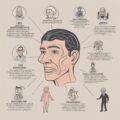The Transformative Power of Psychotherapy: A Journey of Self-Discovery and Healing
Psychotherapy, often simply referred to as therapy, is a powerful tool for personal growth, healing, and self-discovery. This collaborative process between a trained mental health professional and a client can lead to profound positive changes in one’s life. In this article, we’ll explore over 50 research-backed benefits of psychotherapy, highlighting how this compassionate practice can enhance overall wellbeing and quality of life.
Emotional Wellbeing: Nurturing a Healthier Mindset
One of the primary benefits of psychotherapy is its positive impact on emotional wellbeing. Research has consistently shown that therapy can:
- Reduce symptoms of depression and anxiety
- Improve emotional regulation and resilience
- Enhance self-esteem and self-confidence
- Promote a more positive outlook on life
- Help process and heal from trauma
- Reduce feelings of loneliness and isolation
- Increase overall life satisfaction
By providing a safe, non-judgmental space to explore emotions and experiences, psychotherapy helps individuals develop a healthier relationship with themselves and their feelings.
Improved Relationships: Fostering Deeper Connections
Psychotherapy can significantly enhance interpersonal relationships. Benefits in this area include:
- Better communication skills
- Increased empathy and understanding of others
- Improved conflict resolution abilities
- Enhanced intimacy in romantic relationships
- Stronger family bonds
- Healthier boundaries in personal and professional relationships
- Reduced social anxiety and improved social skills
By working through personal issues and learning new interpersonal skills, individuals often find their relationships becoming more fulfilling and meaningful.
Cognitive Enhancements: Sharpening the Mind
Psychotherapy can also lead to significant improvements in cognitive functioning. Research-backed benefits include:
- Enhanced problem-solving skills
- Improved decision-making abilities
- Increased self-awareness and introspection
- Better focus and concentration
- Reduced cognitive distortions and negative thought patterns
- Enhanced creativity and flexible thinking
- Improved memory and recall
These cognitive enhancements can have far-reaching effects, improving performance in work, education, and daily life.
Physical Health: The Mind-Body Connection
The benefits of psychotherapy extend beyond mental and emotional wellbeing to physical health. Studies have shown that therapy can:
- Reduce chronic pain
- Improve sleep quality
- Boost immune system functioning
- Lower blood pressure
- Reduce stress-related physical symptoms
- Improve overall physical health outcomes
- Enhance the management of chronic health conditions
By addressing mental health concerns, psychotherapy can have a positive ripple effect on physical health, highlighting the powerful connection between mind and body.
Personal Growth and Self-Actualization
Psychotherapy is a journey of personal growth and self-discovery. It can lead to:
- Increased self-understanding and self-acceptance
- Clarity on personal values and life goals
- Enhanced ability to cope with life’s challenges
- Greater sense of personal empowerment
- Improved ability to make positive life changes
- Increased resilience and adaptability
- A deeper sense of life purpose and meaning
Through the therapeutic process, individuals often find themselves growing in ways they never imagined, leading to a more authentic and fulfilling life.
Frequently Asked Questions About Psychotherapy
1. How long does it take to see benefits from psychotherapy?
The timeline for experiencing benefits from psychotherapy can vary greatly depending on individual circumstances, the nature of the issues being addressed, and the type of therapy. Some people report feeling better after just a few sessions, while others may need several months or even years to achieve their goals. It’s important to remember that therapy is a process, and progress often occurs gradually over time.
2. Is psychotherapy only for people with mental health disorders?
No, psychotherapy can benefit anyone looking to improve their mental wellbeing, personal growth, or life satisfaction. While it is indeed helpful for those with diagnosed mental health conditions, many people seek therapy for personal development, stress management, relationship issues, or to navigate life transitions.
3. How do I choose the right therapist?
Choosing the right therapist involves considering factors such as their expertise, therapeutic approach, and your personal comfort level with them. It’s often helpful to research different types of therapy, read therapist profiles, and even have initial consultations with a few therapists to find the best fit. Remember, the therapeutic relationship is crucial, so it’s important to find someone you feel comfortable opening up to.
4. Can psychotherapy replace medication for mental health issues?
In some cases, psychotherapy alone can be effective in treating mental health issues. However, for certain conditions, a combination of therapy and medication may be most beneficial. This decision should be made in consultation with mental health professionals who can assess your individual needs and recommend the most appropriate treatment plan.
5. Is online therapy as effective as in-person therapy?
Research has shown that online therapy can be just as effective as in-person therapy for many issues. Online therapy offers convenience and accessibility, making it easier for some people to engage in regular sessions. However, the effectiveness can depend on individual preferences, the nature of the issues being addressed, and the quality of the online platform being used.
In conclusion, the benefits of psychotherapy are vast and well-supported by research. From improving emotional wellbeing and relationships to enhancing cognitive functions and physical health, therapy offers a pathway to a more fulfilling and balanced life. Whether you’re dealing with specific mental health concerns or simply seeking personal growth, psychotherapy can be a transformative tool in your journey towards wellbeing and self-discovery. Remember, seeking help is a sign of strength, and everyone deserves the opportunity to live their best life.









